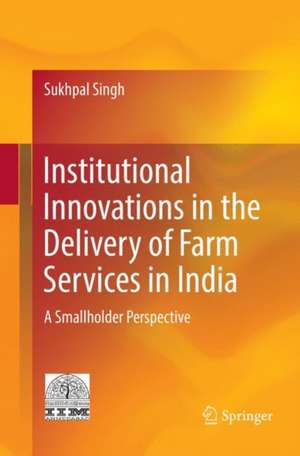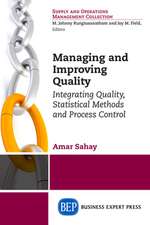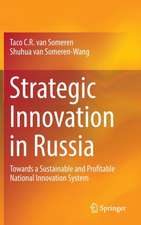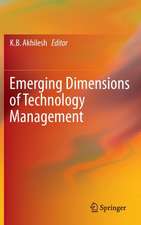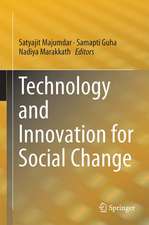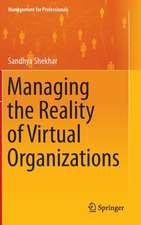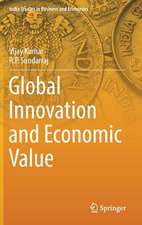Institutional Innovations in the Delivery of Farm Services in India: A Smallholder Perspective
Autor Sukhpal Singhen Limba Engleză Paperback – 15 aug 2018
The book examines agro-input and service delivery business models as institutional innovations for inclusive and effective delivery of such services in the small farmer context, based on primary data from the agencies designing and implementing such models and the farmers who make use of these inputs and services. Further, it identifies major issues and challenges in the delivery of farm inputs and services across regions and types of farmers and examines possible policy and enabling provisions to promote cost-effective and high-quality agro-input delivery channels.
| Toate formatele și edițiile | Preț | Express |
|---|---|---|
| Paperback (1) | 556.64 lei 38-45 zile | |
| Springer India – 15 aug 2018 | 556.64 lei 38-45 zile | |
| Hardback (1) | 645.47 lei 6-8 săpt. | |
| Springer India – 28 sep 2017 | 645.47 lei 6-8 săpt. |
Preț: 556.64 lei
Preț vechi: 695.79 lei
-20% Nou
Puncte Express: 835
Preț estimativ în valută:
106.53€ • 110.37$ • 88.90£
106.53€ • 110.37$ • 88.90£
Carte tipărită la comandă
Livrare economică 17-24 martie
Preluare comenzi: 021 569.72.76
Specificații
ISBN-13: 9788132239024
ISBN-10: 8132239024
Pagini: 246
Ilustrații: XXIV, 246 p.
Dimensiuni: 155 x 235 mm
Ediția:Softcover reprint of the original 1st ed. 2018
Editura: Springer India
Colecția Springer
Locul publicării:New Delhi, India
ISBN-10: 8132239024
Pagini: 246
Ilustrații: XXIV, 246 p.
Dimensiuni: 155 x 235 mm
Ediția:Softcover reprint of the original 1st ed. 2018
Editura: Springer India
Colecția Springer
Locul publicării:New Delhi, India
Cuprins
Chapter 1. Introduction.- Chapter 2. Sale, Purchase and Use of Agri Inputs and Services in India: A review.- Chapter 3. Agro-machinery rental services: Case studies from Punjab.- Chapter 4. Supermarket Retailing of Agro-inputs: A case study from Uttar Pradesh.- Chapter 5. Franchising in Agri-input and market linkage delivery: A case study from Bihar.- Chapter 6. Summary, Conclusions, and Policy implications.- References.
Notă biografică
Sukhpal Singh is Professor at the Centre for Management in Agriculture (CMA), Indian Institute of Management Ahmedabad (IIMA), India and a co-editor of Millennial Asia—an international journal of Asian studies (published by Sage). He has nine books and more than 120 research papers in international and national journals as well as edited books, and more than 70 articles in popular newspapers and magazines to his credit. He was a visiting fellow at the Institute of Development Studies (IDS), Sussex; Chulalongkorn University, Bangkok; the University of Manchester, UK; and the Copenhagen Business School, and is a member of various Government of India committees and working groups on agriculture including those for the 11th and the 12th Five year Plans, National Development Council (NDC), and the erstwhile Planning Commission. He is on the boards of many development agencies and advisory committees of various institutes and projects in India. He has provided research support to the Asian Development Bank (ADB), Food and Agriculture Organization (FAO), International Water Management Institute (IWMI), International Assessment of Agricultural Knowledge, Science and Technology for Development (IAASTD), International Labour Organization (ILO), ICCO, The Netherlands, International Fund for Agricultural Development (IFAD) of the United Nations (UN), Traidcraft, and the World Bank. His research interests are in the agro value chain development, management, and governance from a small producer and worker perspective.
Textul de pe ultima copertă
This book uses primary evidence to assess the value of agro-input and service delivery business models in terms of their inclusiveness, effectiveness and impact from a small farmer perspective, in the form of case studies in three Indian states: Punjab, Bihar and Uttar Pradesh. The services discussed include custom rental of farm machinery and equipment, franchising for backward and forward linkage for farmers and the supermarkets for delivery of farm inputs, and extension services.
The book examines agro-input and service delivery business models as institutional innovations for inclusive and effective delivery of such services in the small farmer context, based on primary data from the agencies designing and implementing such models and the farmers who make use of these inputs and services. Further, it identifies major issues and challenges in the delivery of farm inputs and services across regions and types of farmers and examines possible policy and enabling provisions to promote cost-effective and high-quality agro-input delivery channels.
The book examines agro-input and service delivery business models as institutional innovations for inclusive and effective delivery of such services in the small farmer context, based on primary data from the agencies designing and implementing such models and the farmers who make use of these inputs and services. Further, it identifies major issues and challenges in the delivery of farm inputs and services across regions and types of farmers and examines possible policy and enabling provisions to promote cost-effective and high-quality agro-input delivery channels.
Caracteristici
Explores the innovative distribution channels and business models of agro-input players in India as institutional innovations Examines the smallholder inclusiveness of such channels Discusses the nature of these channels and their effectiveness in helping farmers access better inputs and services Combines agency/business and farmer perspectives to examine the inclusiveness, effectiveness, and efficiency of business models involving institutional innovations Includes supplementary material: sn.pub/extras
